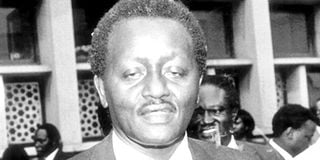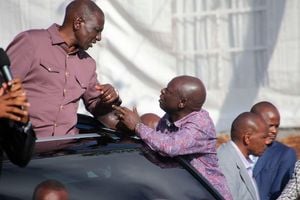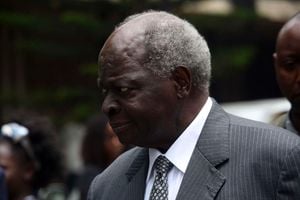Magugu mastered art of political survival

Former Cabinet minister Arthur Magugu who died on September 15, 2012. Photo/FILE
What you need to know:
- Soft-spoken former Finance minister will be remembered for edging out what was then known as the Kiambu mafia
- He was the only MP who served the entire term on sick leave. He did not attend any House session.
Arthur Kinyanjui Magugu, who died on Saturday, was a never-say-die politician with many distinctions.
Never-say-die because Mr Magugu never gave up hope to live even after ailing for more than 10 years.
Soft-spoken and self-effacing, he gave the false image of a shy man yet he was a hands-on politician.
He gained prominence in Central Province in the post-Kenyatta era, edging out what was then known as the Kiambu mafia led by Cabinet ministers Mbiyu Koinange and Njenga Karume after founding President Jomo Kenyatta died in 1978.
He quickly endeared himself to President Daniel arap Moi, who elevated him to a full Cabinet post. He became so powerful that he hounded out of Githunguri constituency former Vice-President Josephat Karanja — thrashing him twice in 1979 and 1983 elections.
Dr Karanja never saw Parliament until he shifted his political base to then Nairobi’s Mathare constituency, thanks to a by-election in 1986 after area MP Andrew Kimani Ngumba fled the country amid political turbulence.
Kenyans aged below 30 years may not know the man who in 1980s was a political giant.
His squinty eyes earned him various names — baby face, lady face and the smiling Arthur.
His hands-on style emerged when he was appointed Health minister after the 1979 elections. He is remembered for impromptu visits to hospitals, giving orders to medical staff to ensure quick attention to the sick and suspending those who were not found at their work stations.
But he will be remembered for three things. First, he gave a famous statement after a Mercedes-Benz car he was driving was involved in a fatal accident with another car in Kiambu in 1983.
“I was driving a safe car. Had it not been for this, I would be dead,” he told journalists.
In 1983, as Finance minister, he postponed the reading of the Budget by a week — the only time in Kenya’s history the Budget was delayed.
That year, President Moi had used powers in the old constitution to dissolve Parliament and call a snap election. This followed the “traitor” debate in which former Constitutional Affairs minister Charles Njonjo was accused of plotting with foreign powers to overthrow the Moi regime — a commission of inquiry later absolved him of the charge.
Mr Magugu told journalists at his Treasury Building office that the delay was “a small matter” as every minister was facing a big battle for political survival.
Many politicians who were perceived to have been pro-Njonjo became parries and were swept out of Parliament that year in what appeared to be a political purge to bring in Moi loyalists.
Last punch
He survived and lived to see Dr Karanja become VP, albeit for a brief period. But Mr Magugu was to have his day again in Parliament to throw the last punch at his political nemesis in a debate which fell Dr Karanja from the VP perch.
In a scheme similar to that which fell Mr Njonjo, Mr Moi returned from an overseas trip to declare that there was no position for an acting President in Kenya, triggering public debate of “a kneel before me politician” who was out to undermine Mr Moi.
Mr Magugu took advantage of a motion of no confidence in the VP brought by former Embakasi MP David Mwenje to hit hard at Dr Karanja.
He told Parliament that there was no place for “the Kneel-Before-Mes”.
It was interpreted to mean that he was making a jibe at Dr Karanja, who was perceived as untouchable as the University of Nairobi vice-chancellor. He was known to go playing golf when students were rioting for various grievances.
Mr Magugu told Parliament that Dr Karanja was even overheard boasting that he was acting President when “Mzee was away”.
Even after he was swept out of politics in the 1992 multi-party elections, Mr Magugu still kept his presence felt in Kanu, although he retreated to his personal businesses.
In 2002, he returned as MP for Githunguri on a Kanu ticket riding on a wave that swept Kiambu when Deputy Prime Minister Uhuru Kenyatta ran for presidency.
With his health already deteriorated, Mr Magugu only made it to the swearing-in ceremony in Parliament. He was the only MP who served the entire term on sick leave. He did not attend any House session.
Mr Magugu’s death marks the end of a generation of politicians in Kiambu who found themselves at a crossroads — the Koinange-Karume axis during the Kenyatta regime and the Magugu axis during the Moi era.




